-
#1
Hey,
What is the difference between «might be» and «may be»?
«It might be that…»
«It may be that…»
-
#2
I cannot say for sure, but as a native English speaker, I use
«It might be that…» when I am grasping for something outside of myself and am making an educated guess as to what «it might be».
I use
«It may be that…» when I have an idea as to what the reason is, as to what it may be.
Examples:
Why is he so irritable? «It might be that he’s just tired today.» (I’m guessing as to what might be causing his irritablilty.)
Why is he so irritable? «It may be that his baby kept both him and his wife up all night last night.» (I’m more specific as to what I think may be the cause of his irritability.)
Other English speakers?
Experts with a rule?
(….And, yes, it’s him—not he. You could also say, «…his wife and him up all night last night.»
-
#3
gou said:
Hey,
What is the difference between «might be» and «may be»?«It might be that…»
«It may be that…»
Hola gou;
They are Synonyms…Either can be used..
Main Entry: maybe
Part of Speech: adverb
Definition: possibly
Synonyms: can be, conceivable, conceivably, could be, credible, feasible, imaginably, might be, obtainable, perchance, perhaps, weather permitting
te gato
-
#4
mjscott said:
I cannot say for sure, but as a native English speaker, I use
«It might be that…» when I am grasping for something outside of myself and am making an educated guess as to what «it might be».
I use
«It may be that…» when I have an idea as to what the reason is, as to what it may be.Examples:
Why is he so irritable? «It might be that he’s just tired today.» (I’m guessing as to what might be causing his irritablilty.)
Why is he so irritable? «It may be that his baby kept both him and his wife up all night last night.» (I’m more specific as to what I think may be the cause of his irritability.)
Other English speakers?
Experts with a rule?(….And, yes, it’s him—not he. You could also say, «…his wife and him up all night last night.»
I would get no difference in meaning from your example sentences. I would pick up more difference from body language, facial expressions, etc.
-
#5
Thanks.
Is «maybe» one word in all cases?
-
#6
gou said:
Thanks.
Is «maybe» one word in all cases?
Hola gou,
No not in all cases..
but used as one word mostly now.
May be was used a long time ago…Not so much now.
te gato
-
#7
Ooops. I say «may be» a lot. Makes me feel very old when someone says that it was used long ago!
It may be cheaper at Kmart.
I may not go because I just don’t have the time.
I suppose it’s a matter of personal choice here. They are synonymous. Maybe is a separate word, an adverb. May be is an auxiliary verb conjugation.
Maybe I will go. I’m not sure yet.
I may be going. I’m not sure yet.
-
#8
jacinta said:
Ooops. I say «may be» a lot. Makes me feel very old when someone says that it was used long ago!
It may be cheaper at Kmart.
I may not go because I just don’t have the time.I suppose it’s a matter of personal choice here. They are synonymous. Maybe is a separate word, an adverb. May be is an auxiliary verb conjugation.
Maybe I will go. I’m not sure yet.
I may be going. I’m not sure yet.
Hola jacinta;
HA HA HA I was not implying that you were OLD…Just that the dictionary said that it was the old way of saying it…So the dictionary called you old not me!!
te gato
-
#9
Thanks a lot guys.
>I may be going. I’m not sure yet.
This one seems more clever.
Sorry if I’m asking too many questions, but may I ask what auxiliary verb conjugations are?
-
#10
jacinta said:
Ooops. I say «may be» a lot. Makes me feel very old when someone says that it was used long ago!
It may be cheaper at Kmart.
I may not go because I just don’t have the time.I suppose it’s a matter of personal choice here. They are synonymous. Maybe is a separate word, an adverb. May be is an auxiliary verb conjugation.
Maybe I will go. I’m not sure yet.
I may be going. I’m not sure yet.
Have you seen «maybe» in stead of «maybe» for the meaning «perhaps»?
I don’t recall seeing it, but right now I’m reading a book that deliberately uses older forms of English in order to set a «mood» (this is going back a couple centuries), and all sorts of words are deliberately separated there such as:
no one
no body
every one
It’s quite interesting actually. Words are continuously being joined. I find this out as I write a compound word, feeling sure it is WRONG, then find out my spellchecker accepts it (because it is now correct). Ironically, my spellchecker does not accept «spellchecker as a word».
Gaer
-
#11
Hi everybody,
May and might are both modal auxiliaries. They belong to a class of verbs that include other words like should, can, could, would, etc… Historically (a hundred years, or more, ago) might was the past tense of may, much in the same way that could is the past tense of can today. But currently they both have a present tense meaning.
May + verb! Remember that may and might can be followed by any verb, not just be.
I may run
I may start smoking
It might rain… etc…
The difference between these words has to do with probability or certainty.
Modals can be arranged on the following continuum. The ones on the top show a HIGH degree of probability. The ones on the bottom show a low degree of probability.
It will rain tomorrow Highest degree of probability
It should rain tomorrow
It may rain tomorrow
It could/might rain tomorrow Lowest degree of probability
These questions are fun to answer! I am studying linguistics and we are reading about modals this week!
S.
-
#12
Wait, so «may» shows a higher degree of probability than «might»?
Are they both modal auxiliaries and neither of them are an adverb or an auxiliary verb conjugation? I’m confused.
-
#13
sperdomo said:
Hi everybody,
May and might are both modal auxiliaries. They belong to a class of verbs that include other words like should, can, could, would, etc… Historically (a hundred years, or more, ago) might was the past tense of may, much in the same way that could is the past tense of can today. But currently they both have a present tense meaning.
May + verb! Remember that may and might can be followed by any verb, not just be.
I may run
I may start smoking
It might rain… etc…The difference between these words has to do with probability or certainty.
Modals can be arranged on the following continuum. The ones on the top show a HIGH degree of probability. The ones on the bottom show a low degree of probability.It will rain tomorrow Highest degree of probability
It should rain tomorrow
It may rain tomorrow
It could/might rain tomorrow Lowest degree of probabilityThese questions are fun to answer! I am studying linguistics and we are reading about modals this week!
S.
For me, these have the same meanings, in writing. In other words, all will give me the same feeling of «perhaps»:
It may rain tomorrow.
It could/might rain tomorrow.
But in other sentences, I agree with you. «May» would indicate a higher probability than «might».
This is REALLY a delicate point, don’t you think?
-
#14
gaer said:
For me, these have the same meanings, in writing. In other words, all will give me the same feeling of «perhaps»:
It may rain tomorrow.
It could/might rain tomorrow.But in other sentences, I agree with you. «May» would indicate a higher probability than «might».
This is REALLY a delicate point, don’t you think?
And I will add that, for the life of me, I cannot see any difference between «it may rain» and «it might rain».
If you eat those 10 donuts, you may feel sick.
If you eat those 10 donuts, you might feel sick.
If you eat those donuts, you could feel sick.
All give the possibility. Actually, I feel a little sick writing this sentence three times
-
#15
gaer said:
Have you seen «maybe» instead of «maybe» for the meaning «perhaps»? >>> you meant may be??
I don’t recall seeing it, but right now I’m reading a book that deliberately uses older forms of English in order to set a «mood» (this is going back a couple centuries), and all sorts of words are deliberately separated there such as:no one
no body
every oneIt’s quite interesting actually. Words are continuously being joined.>>> yes this is a tendency in language
I find this out as I write a compound word, feeling sure it is WRONG, then find out my spellchecker accepts it (because it is now correct). Ironically, my spellchecker does not accept «spellchecker as a word».
Gaer
Maybe (adverb) = perhaps >> Maybe she got lost.
There may be other problems that we don’t know about. >>>> possibility
This tendency is called «up-grading» of units. There is a hierarchical cline, which indicates that words are first paired into syntactic groups, then they may become collocations, later composite and compound lexemes and then may ginally end up by developing into the direction of «monolithicity», i.e. the unit is no longer felt as a compound but only one word.
Eg,
cupboard -vineyard-paperback-blackmail >>> these words were compound words in their origins but then they turned into one single word.
-
#16
jacinta said:
And I will add that, for the life of me, I cannot see any difference between «it may rain» and «it might rain».
If you eat those 10 donuts, you may feel sick.
If you eat those 10 donuts, you might feel sick.
If you eat those donuts, you could feel sick.All give the possibility. Actually, I feel a little sick writing this sentence three times
I feel the same way. But as I started to say that when I last responded, I followed with another sentence, quite by accident, in which I wrote «might», and when I thought about using «may» instead, it felt different to me.
Now I can’t think of one example. Language is truly an elusive thing…
Gaer
-
#17
Artrella said:
Maybe (adverb) = perhaps >> Maybe she got lost.
There may be other problems that we don’t know about. >>>> possibility
This tendency is called «up-grading» of units. There is a hierarchical cline, which indicates that words are first paired into syntactic groups, then they may become collocations, later composite and compound lexemes and then may ginally end up by developing into the direction of «monolithicity», i.e. the unit is no longer felt as a compound but only one word.
Eg,
cupboard -vineyard-paperback-blackmail >>> these words were compound words in their origins but then they turned into one single word.
I know this happens continually in German. Does it also happen in Spanish and French, I wonder?
Gaer
-
#18
gaer said:
I know this happens continually in German. Does it also happen in Spanish and French, I wonder?
Gaer
Hola Guys
Do you think MAYBE/MAY BE we are done with this thread..
te gato
-
#19
te gato said:
You may be right, although maybe others might not be ready to quit.
-
#20
Hi,
Yes, I agree that it is difficult to decide which is more probable, may or might. But, I think the basic idea is right. Modals are arranged on a continuum each one offers a slightly different meaning.
I may marry you
I might marry you
These are very close in meaning. yes, it’s a very delicate point!
Maybe and may are completely different words! Historically they are related, but today maybe is an adverb and may is an modal auxiliary verb. That’s the text book label. According to my textbook, the order of the continuum is different in the negative, but I left that out becuase I thought it was too complicated!
OK, maybe and may be sound exactly the same, so don’t worry about it when you are speaking. It’s only when you write them you have to be careful.
you maybe right. This is wrong because there is no verb in this sentence.
you may be right. This is correct. The main verb is be and the modal auxiliary verb is may.
-
#21
I’ve always thought that «maybe» and «may be» were different.
Mybe it’s true.
May be it’s true.
It may be true.
It maybe true.
Can anyone clearify this for me?
-
#22
gou said:
I’ve always thought that «maybe» and «may be» were different.
Maybe it’s true.
May be it’s true.
It may be true.
It maybe true.
Can anyone clearify this for me?
Do you know the difference between an adverb and a verb?
It may be true=it might be true=it could be true. These are verbs. Here may, might and could are called «modal verbs». They are a bit strange.
Maybe it’s true=Maybe it is true. The word «is» now becomes the verb. Maybe becomes a modifying word expressing possibility.
These are similar.
Maybe it’s true.
Possibly it’s true.
Here «maybe»=»possibly».
Does this help, or have I made it worse?
Gaer
-
#23
About the how possibility an incident can be, we have lots of modals in English language, please tell the degree of possibility of the following.
1) They could have killed him.
2) They may have killed him.
3) They might have killed him.
Very possibly yours, thanks a lot.
-
#24
Shu_Fen said:
About the how possibility an incident can be, we have lots of modals in English language, please tell the degree of possibility of the following.
1) They could have killed him.
2) They may have killed him.
3) They might have killed him.
Very
sincerely
yours, thanks a lot.
All three mean about the same thing to me.
Присоединяйтесь к Reverso, это удобно и бесплатно!
английский
арабский
немецкий
английский
испанский
французский
иврит
итальянский
японский
корейский
голландский
польский
португальский
румынский
русский
шведский
турецкий
украинский
китайский
Показать больше
(греческий, хинди, тайский, чешский…)
чешский
датский
греческий
фарси
хинди
венгерский
словацкий
тайский
Показать меньше
русский
Синонимы
арабский
немецкий
английский
испанский
французский
иврит
итальянский
японский
корейский
голландский
польский
португальский
румынский
русский
шведский
турецкий
украинский
китайский
Показать больше
чешский
датский
греческий
фарси
хинди
венгерский
словацкий
тайский
Показать меньше
На основании Вашего запроса эти примеры могут содержать грубую лексику.
На основании Вашего запроса эти примеры могут содержать разговорную лексику.
Maybe one word would be enough.
What one word would describe your family?
One word would be enough to express Yosef’s greatest feature: love.
Одного слова будет достаточно, чтобы выразить самое характерное качество Йосефа: любовь.
One word would suffice, participation.
Результатов: 8814. Точных совпадений: 1. Затраченное время: 276 мс
Documents
Корпоративные решения
Спряжение
Синонимы
Корректор
Справка и о нас
Индекс слова: 1-300, 301-600, 601-900
Индекс выражения: 1-400, 401-800, 801-1200
Индекс фразы: 1-400, 401-800, 801-1200
© 2013-2022 Reverso Technologies Inc. Все права защищены.
Слайд 1Teacher Resource Disc
Slide shows for use with
PowerPoint presentation software
Betty Schrampfer
Azar
Stacy A. Hagen
Laurette Poulos Simmons
Copyright © 2007 by Pearson Education, Inc.
All rights reserved.
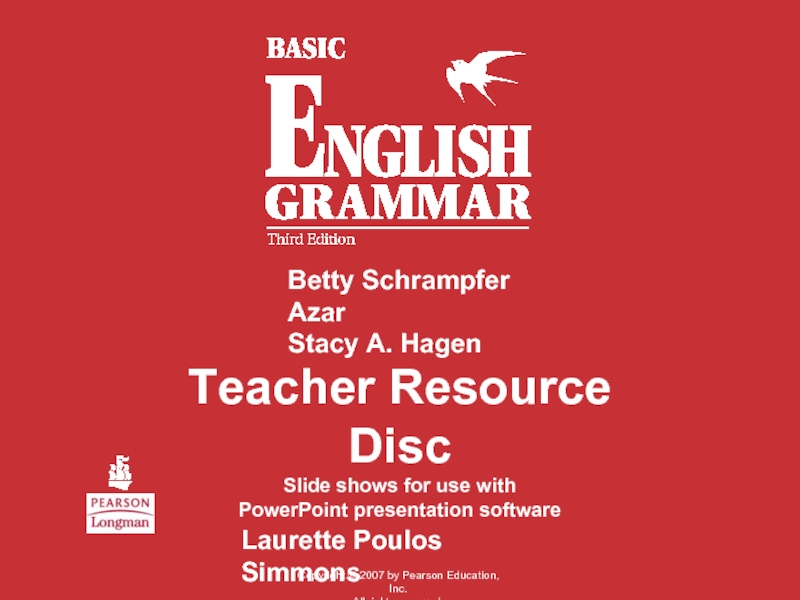
Слайд 2
11-1 May / Might vs. will
11-2 Maybe (one word) vs. may be (two
words)
11-3 Future time clauses with before, after, and when
11-4 Clauses with if
11-5 Expressing habitual present with time clauses…
11-6 Using what + a form of do
CONTENTS
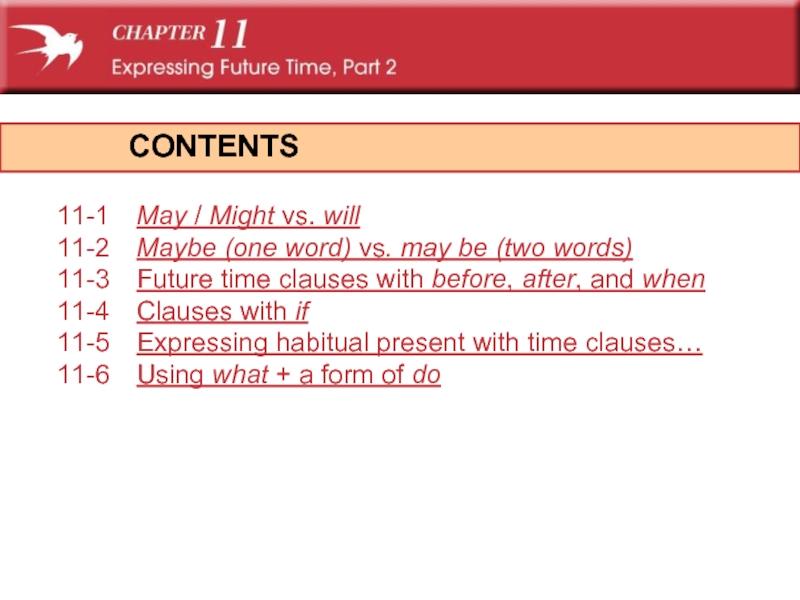
Слайд 3It may rain tomorrow.
11-1 MAY / MIGHT vs. WILL
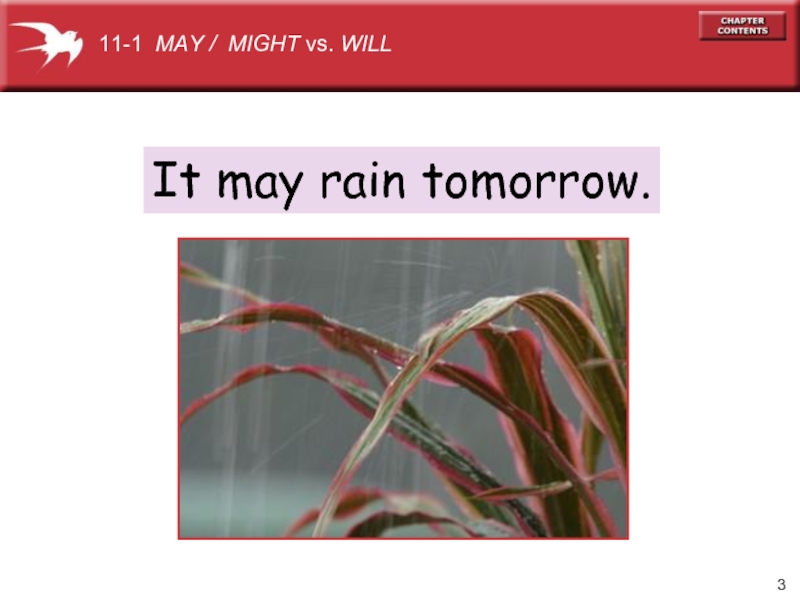
Слайд 4(a) It may rain
.
May + verb
future
tomorrow
11-1 MAY / MIGHT vs. WILL
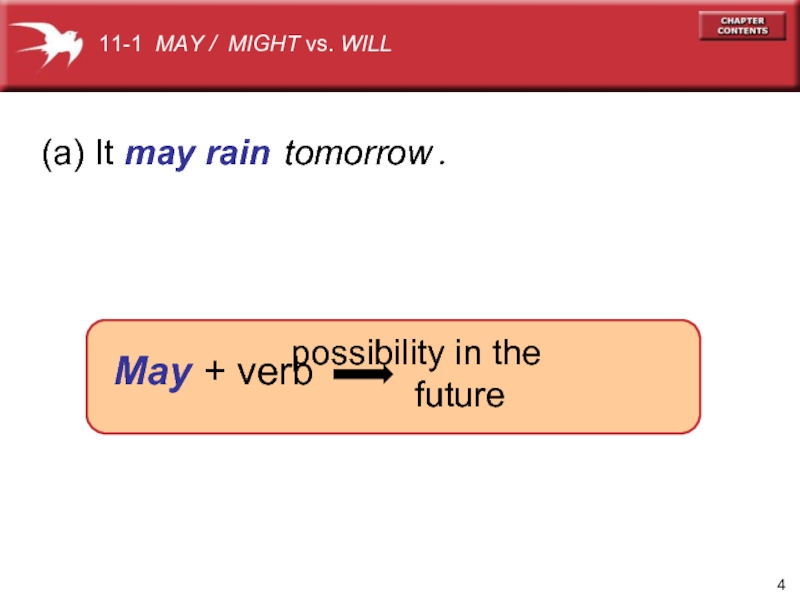
Слайд 5(a) It may rain
(b) Zoe may be at school
May + verb
future
or
tomorrow .
now.
11-1 MAY / MIGHT vs. WILL
present

Слайд 6(a) It may rain
(b) Zoe may be at school
tomorrow.
now.
(c) It might rain tomorrow.
(d) Zoe might be at school now.
may = might
11-1 MAY / MIGHT vs. WILL
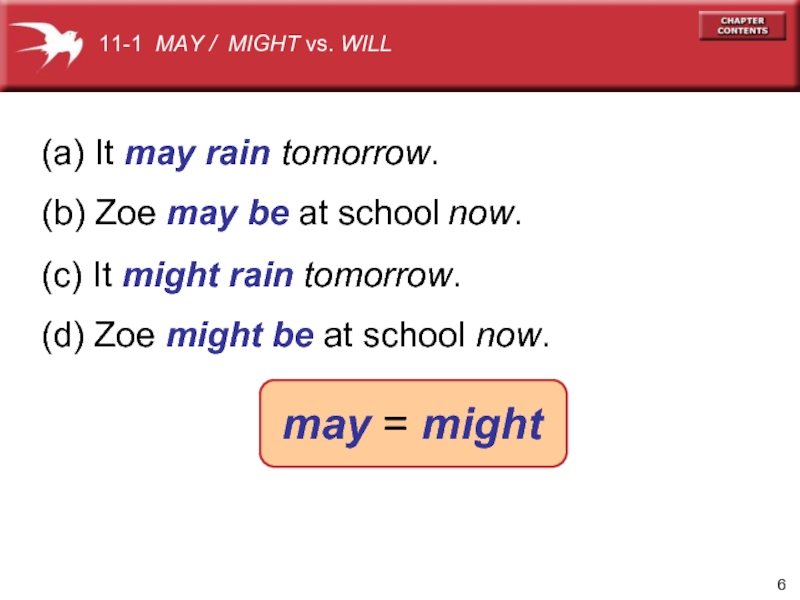
Слайд 7(a) It
(b) Zoe at school
tomorrow.
now.
(c) It tomorrow.
(d) Zoe at school now.
may rain = might rain
11-1 MAY / MIGHT vs. WILL
may rain
may be
might rain
might be
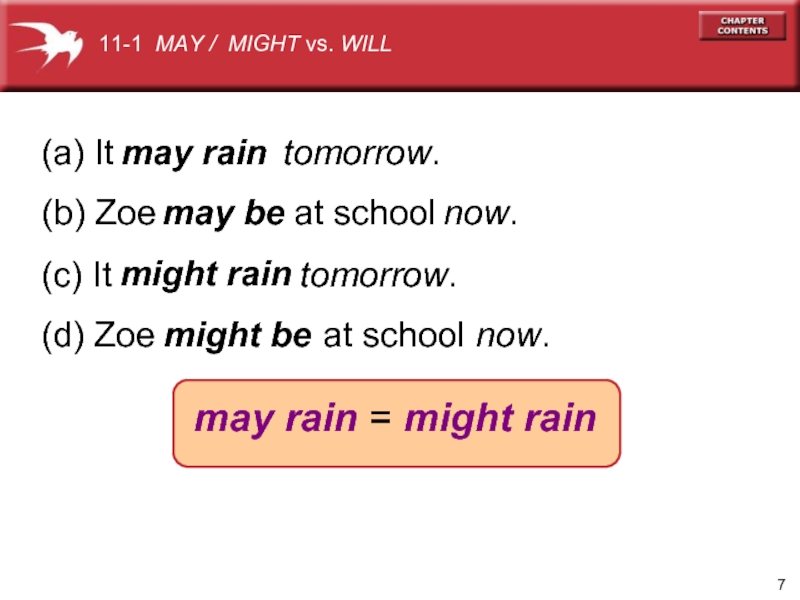
Слайд 8(a) It
(b) Zoe at school
tomorrow.
now.
(c) It tomorrow.
(d) Zoe at school now.
may be = might be
11-1 MAY / MIGHT vs. WILL
may rain
may be
might rain
might be
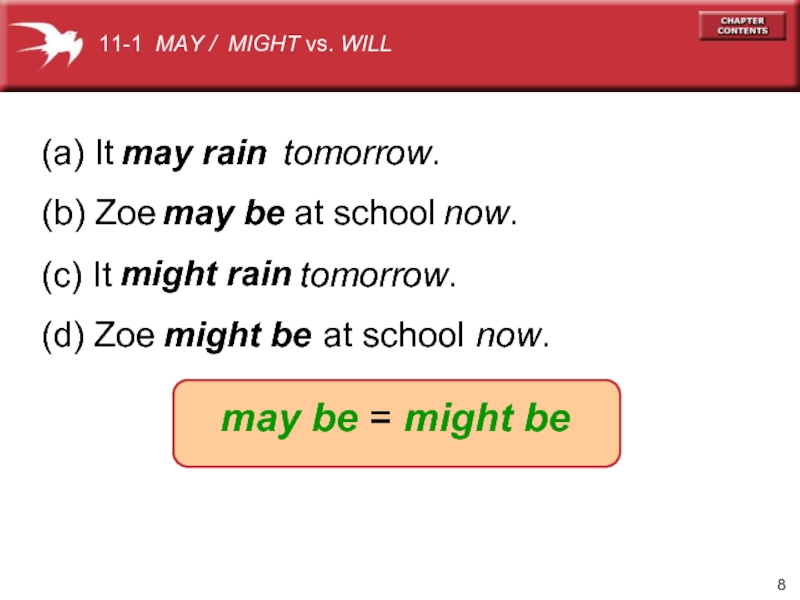
Слайд 9(e) Mr. Lee will be at work tomorrow.
(f) Theresa may /
might be at the party tonight.
speaker doesn’t
may / might be
know
speaker feels
will be
sure
11-1 MAY / MIGHT vs. WILL
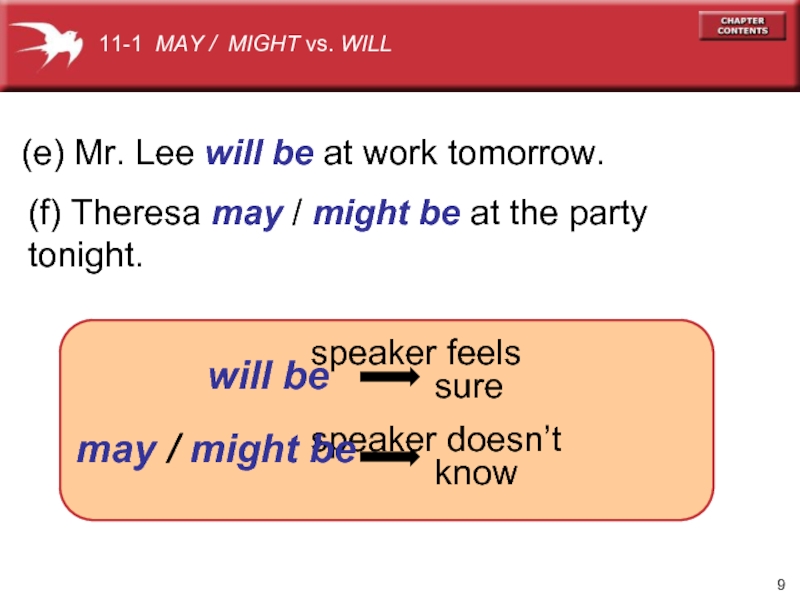
Слайд 10
(f) Theresa may
be at the party tonight.
Theresa may / might not be at the
party tonight.
may / might + not
11-1 MAY / MIGHT vs. WILL
may be
may not be
might not be
NEGATIVE
similar
meaning

Слайд 11Theresa may will be at the party tonight.
Theresa might will
be at the party tonight.
?
?
11-1 MAY / MIGHT vs. WILL
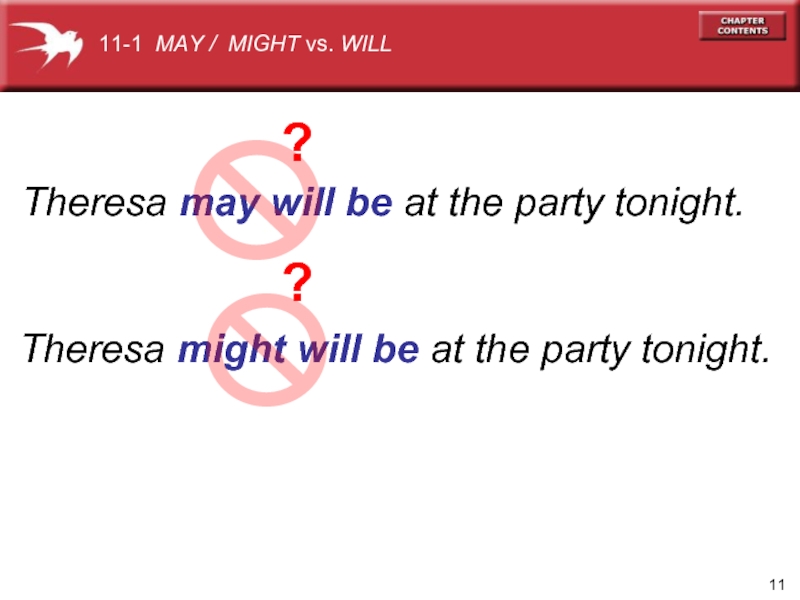
Слайд 12 I will be 35 years old on Monday.
not sure
sure
11-1
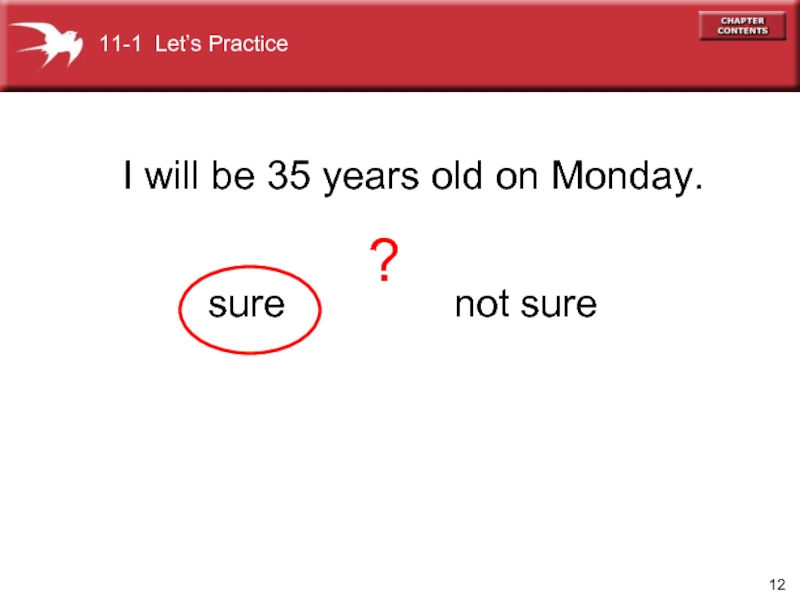
Слайд 13 Adrianna might be at my party.
11-1 Let’s Practice
not sure
sure
?
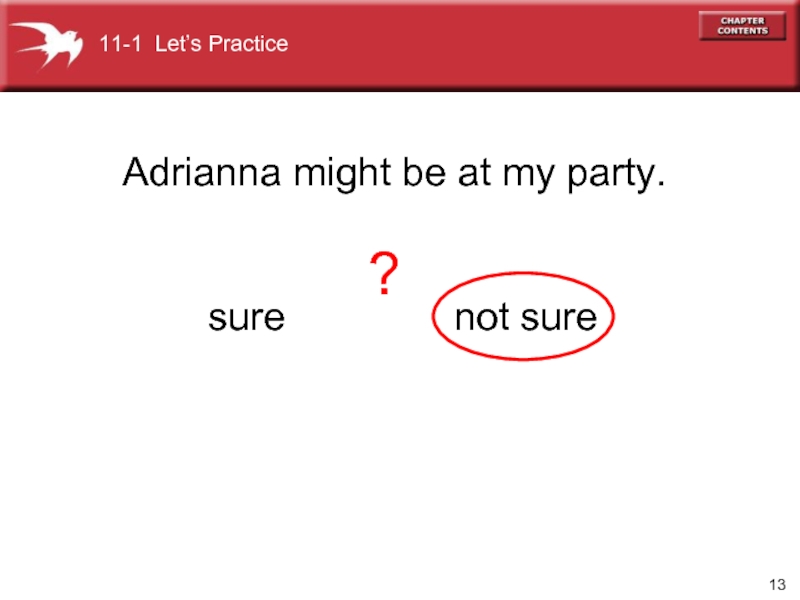
Слайд 14She might go to Hong Kong on Monday.
Yung won’t
be at the party.
11-1 Let’s Practice
not sure
sure
?
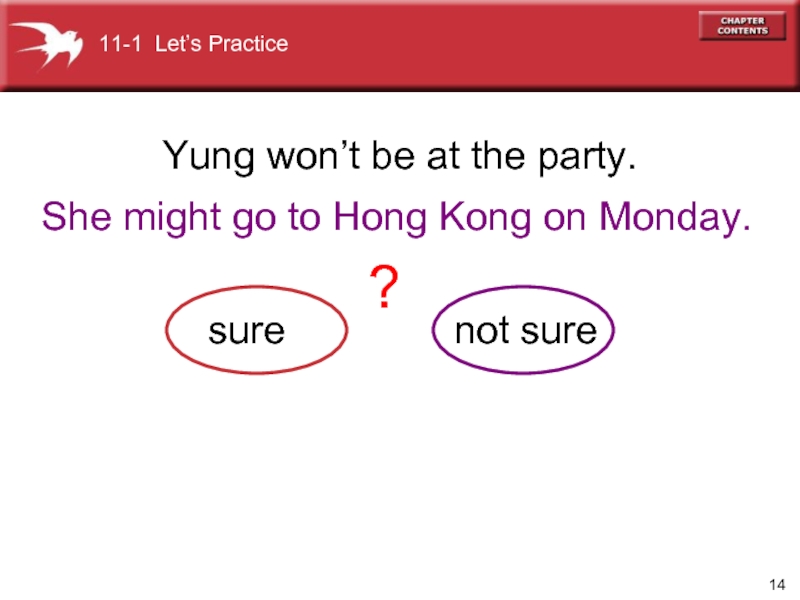
Слайд 15
11-2 MAYBE (ONE WORD) vs. MAY BE (TWO WORDS)
Maybe he will
be in our class.
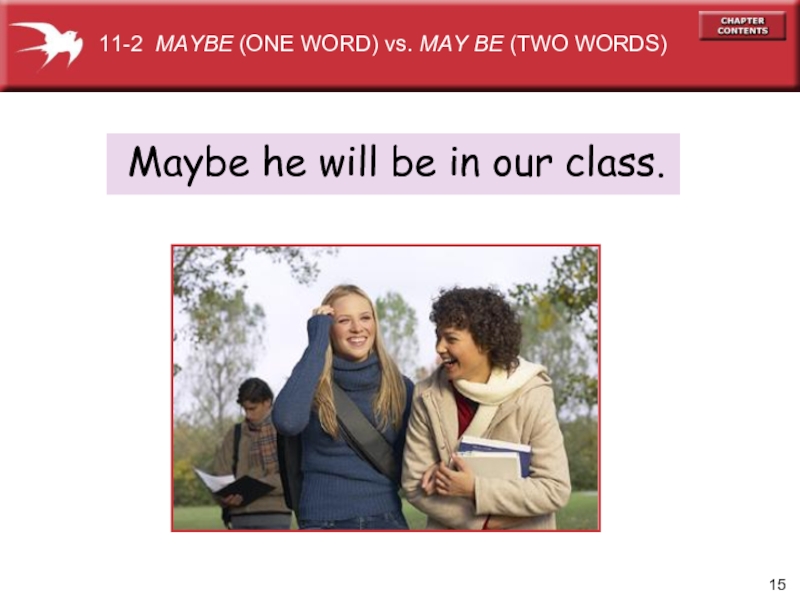
Слайд 16(b) Maybe he will be in our class.
adverb
S
V
(a) “Will he be
in our class?”
“I don’t know. Maybe. Maybe he will be
in our class, and maybe he won’t.”
Maybe = possibility
11-2 MAYBE (ONE WORD) vs. MAY BE (TWO WORDS)
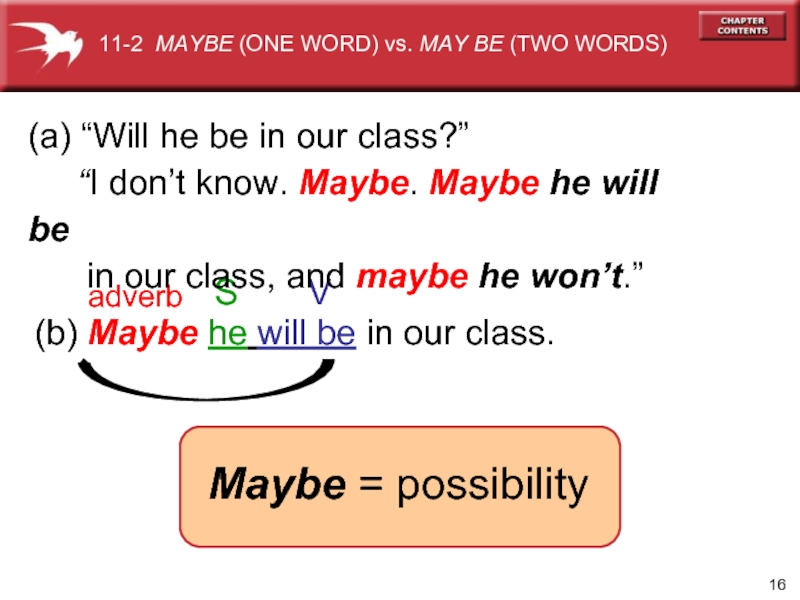
Слайд 17(c) He may be in our class.
V
S
(b) Maybe he will be
in our class.
adverb
S
V
11-2 MAYBE (ONE WORD) vs. MAY BE (TWO WORDS)
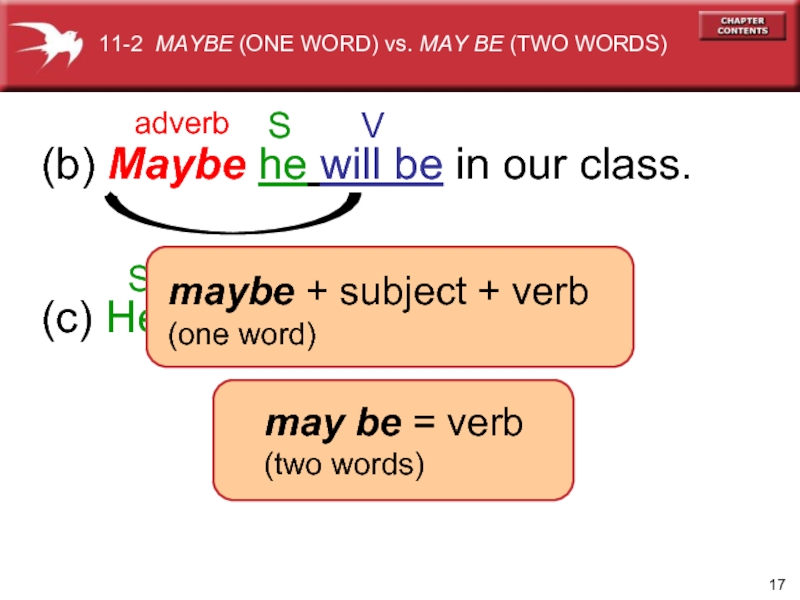
Слайд 18maybe
adverb
may
be
verb
11-2 MAYBE (ONE WORD) vs. MAY BE (TWO WORDS)
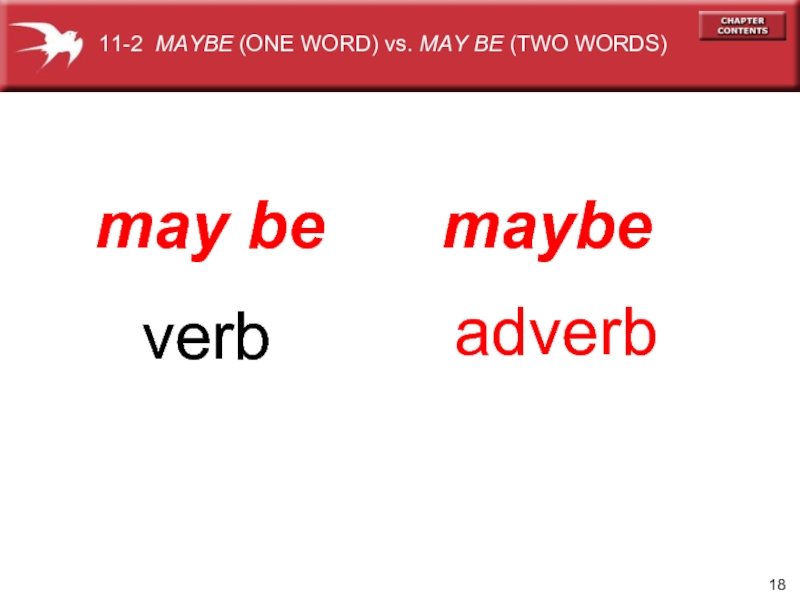
Слайд 19 It ______ fun to go rafting.
may be
maybe
may be
11-2
Let’s Practice
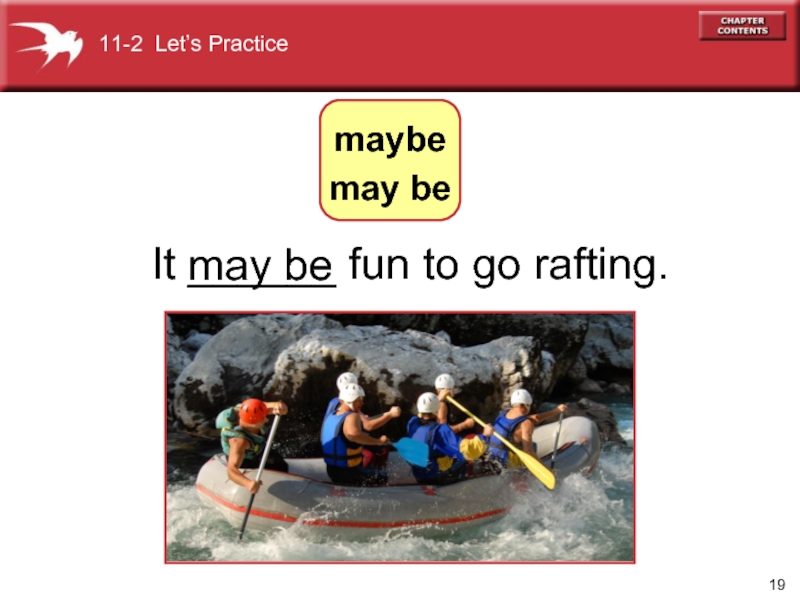
Слайд 20 Rafting ______ expensive.
may be
11-2 Let’s Practice
maybe
may be
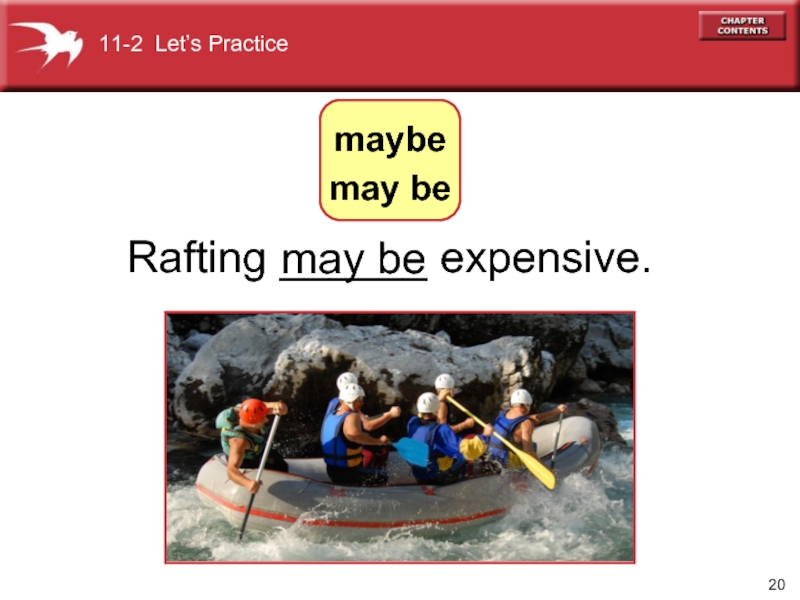
Слайд 21 ______ we have enough money
to go rafting.
Maybe
11-2 Let’s
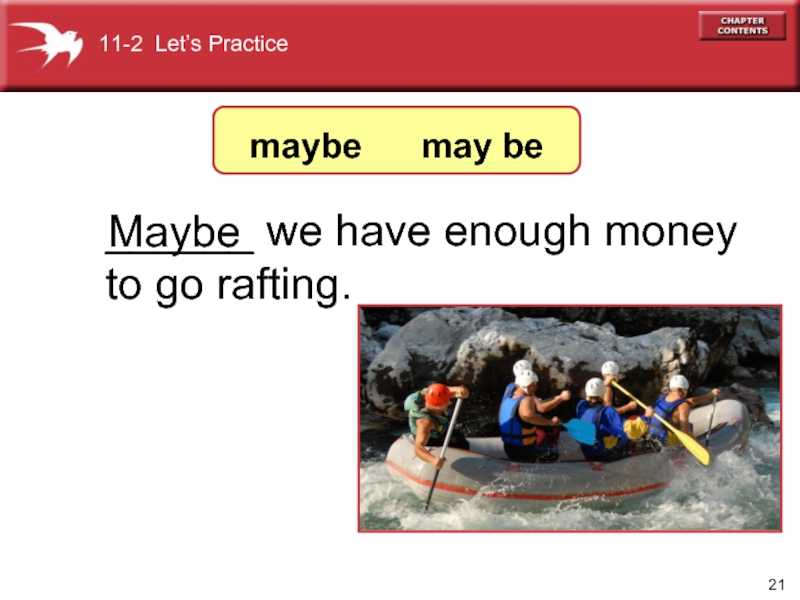
Слайд 22 The weather ______ bad tonight.
______ we will have bad weather.
Maybe
may be
11-2 Let’s Practice
maybe
may be
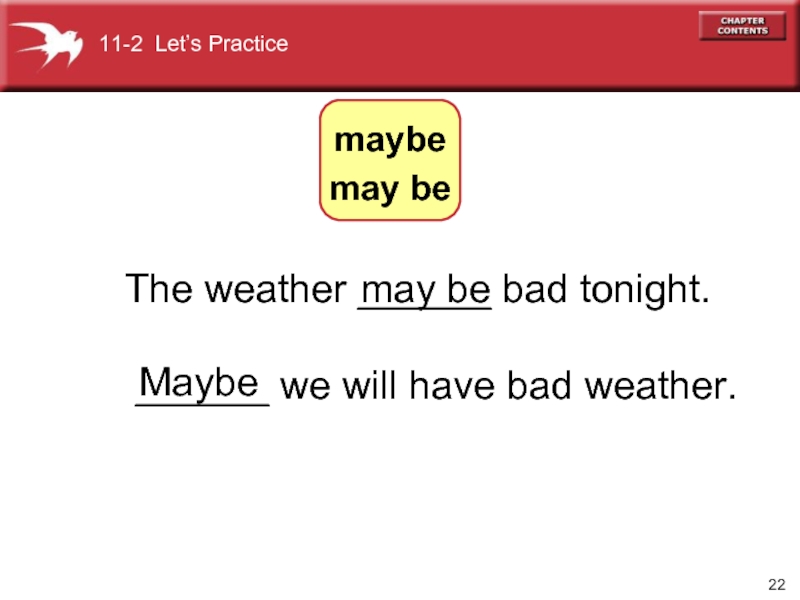
Слайд 23Before Kiara goes home today,
she will do her homework.
11-3 FUTURE TIME
CLAUSES WITH BEFORE, AFTER,
AND WHEN

Слайд 24(a) Before Kiara goes home today,
she will do her homework.
SIMPLE PRESENT
future time clauses
(a) Before Kiara goes home today,
she will do her homework.
Before Kiara will go home today,
she will do her homework.
Before Kiara is going to go home today, she will do her homework.
?
?
11-3 FUTURE TIME CLAUSES WITH BEFORE, AFTER,
AND WHEN
in

Слайд 25(b) Kiara is going to go home today
a future time clause
after she does her homework.
11-3 FUTURE TIME CLAUSES WITH BEFORE, AFTER,
AND WHEN

Слайд 26When I turn 21 next year
a
future time clause
11-3 FUTURE TIME CLAUSES WITH BEFORE, AFTER,
AND WHEN
, I’m going
(c)
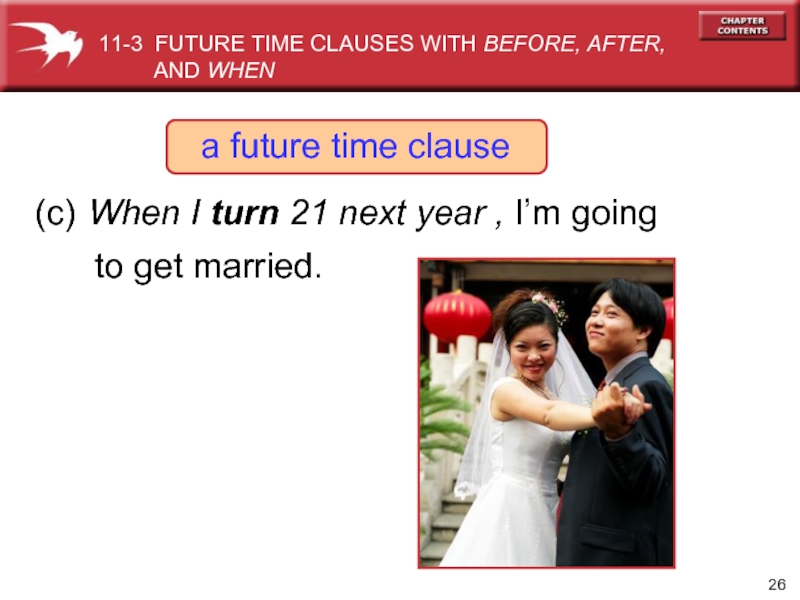
Слайд 27I’m going to go play outside
after I eat another cookie.
time clause
11-3
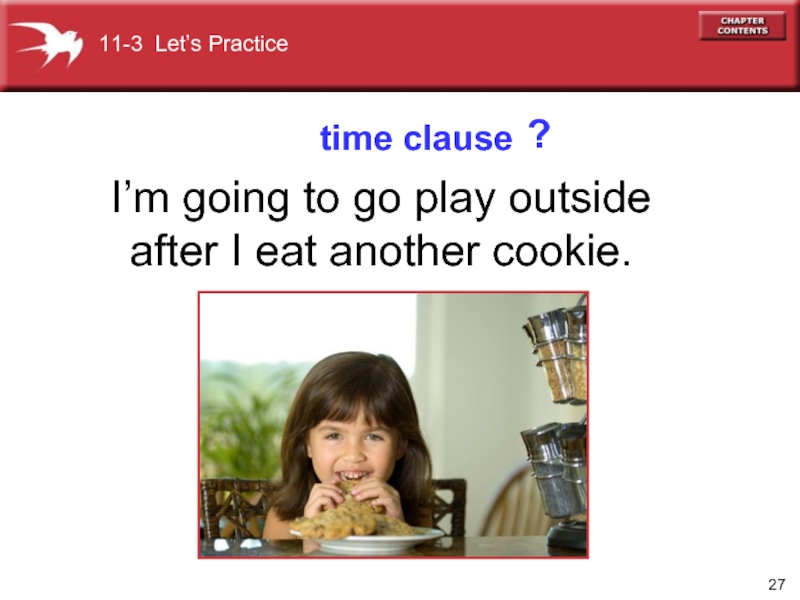
Слайд 28
, I’m going
to buy a scarf at the store.
11-3 Let’s Practice
time clause
Before I go home
?
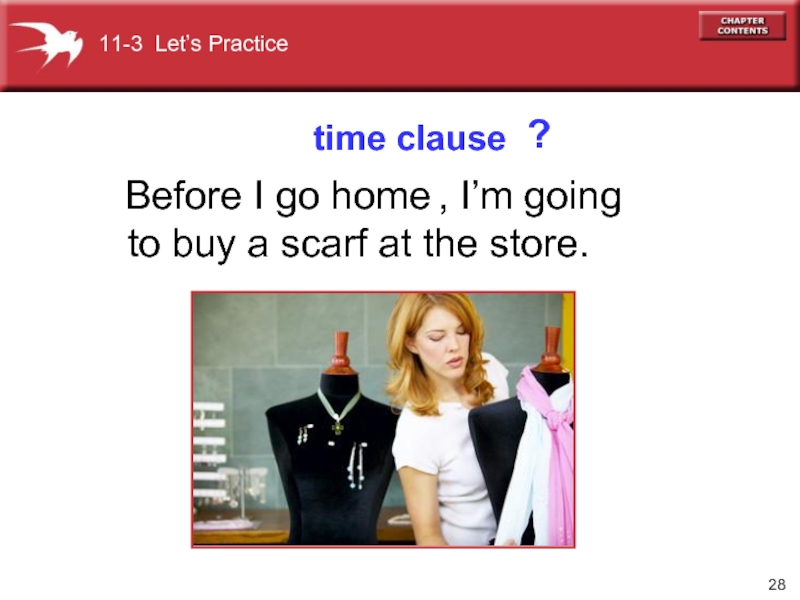
Слайд 29I’m going to be a doctor
after I finish medical school.
11-3 Let’s
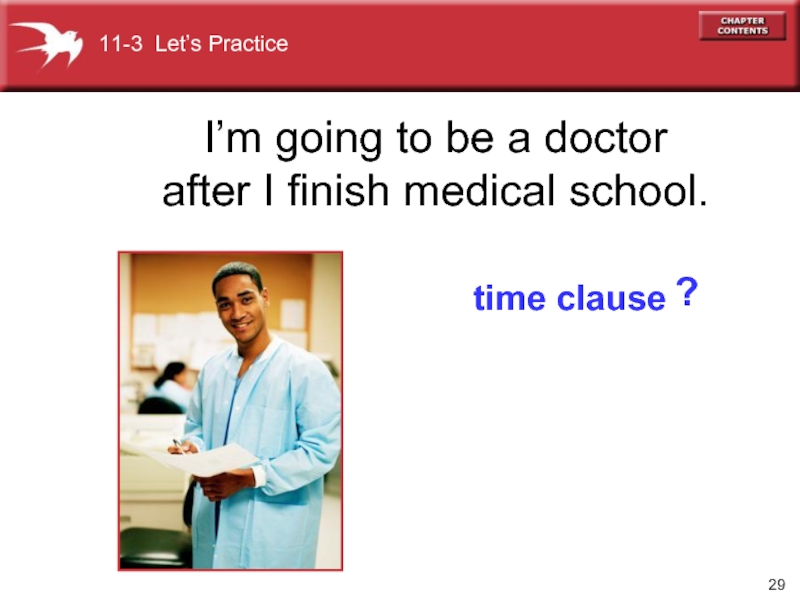
Слайд 30If you cut the carrots,
I’ll make the soup.
11-4 CLAUSES WITH IF
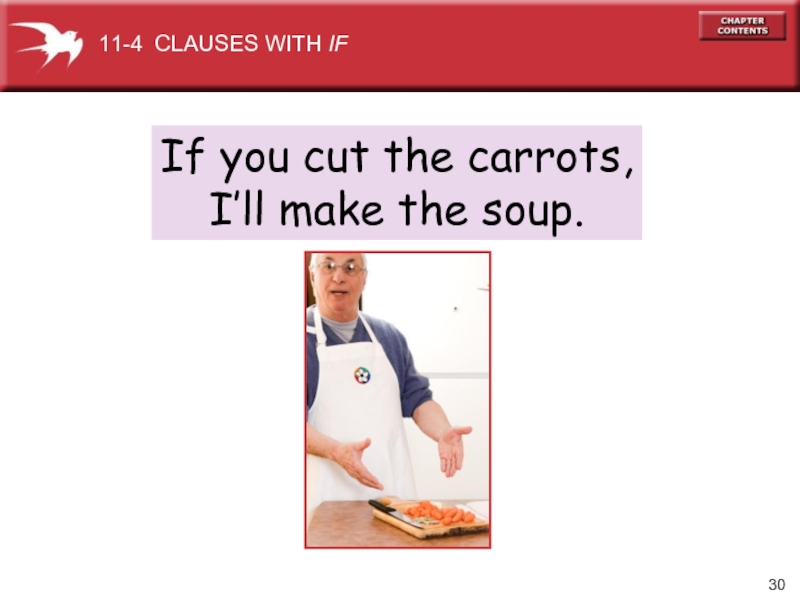
Слайд 31 If you cut the carrots,
(b) I’ll make the
soup
if-clause
I’ll make the soup.
(a)
main clause
if you cut the carrots.
main clause
if-clause
if-clause,
main clause
main clause
if-clause
11-4 CLAUSES WITH IF
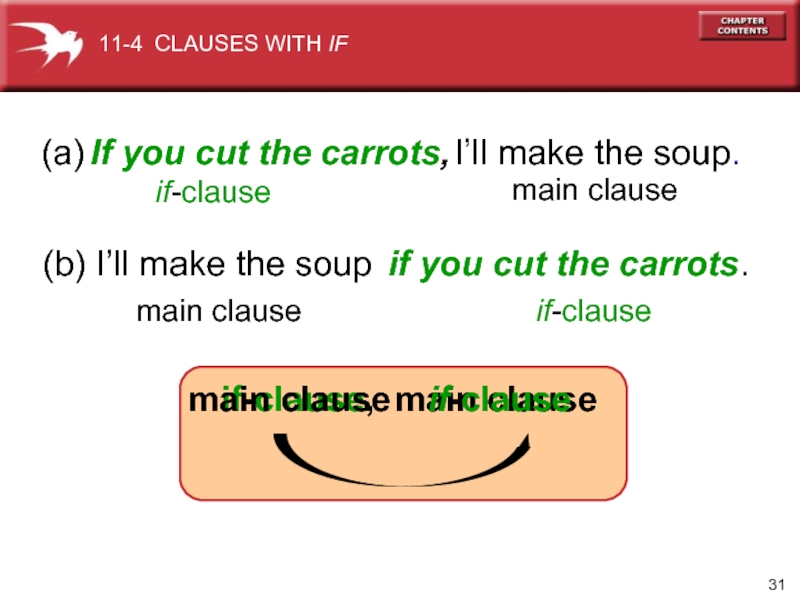
Слайд 32(d) If we don’t have class tomorrow, I’ll go skiing.
I’m
going to go on vacation.
if-clause
(c)
main clause
If I have enough money,
main clause
if-clause
SIMPLE PRESENT
in if-clauses
future time
11-4 CLAUSES WITH IF
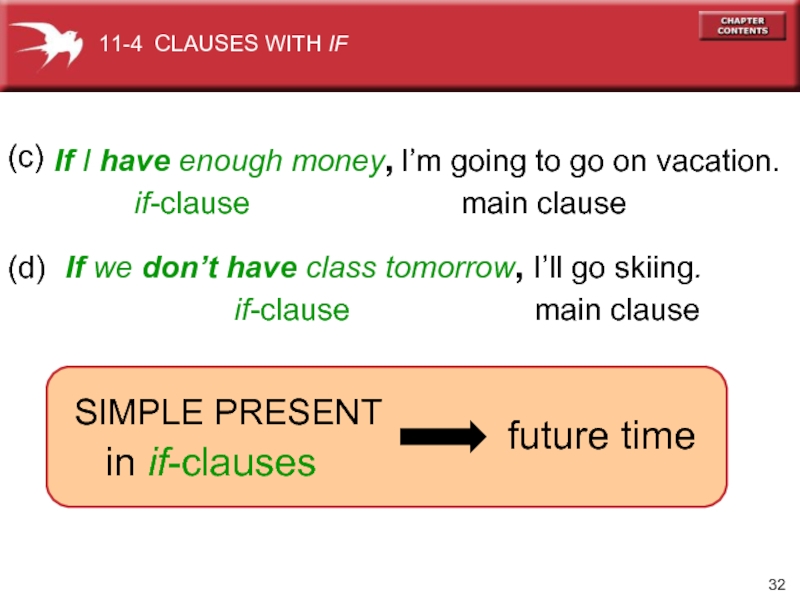
Слайд 33If she ____ us, we ________ her house.
pays
will clean
pay
clean
11-4 Let’s
Practice
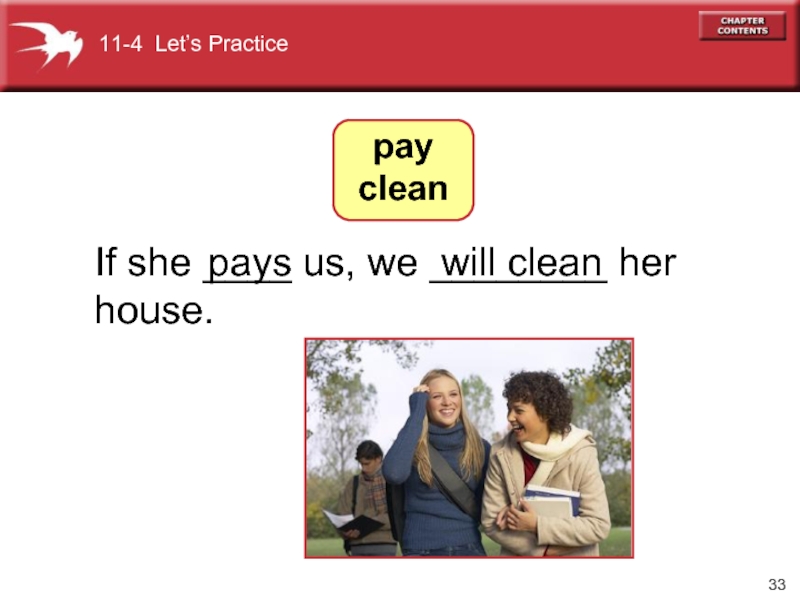
Слайд 34
She ________ great food if
she _______ that chef.
marries
will eat
11-4
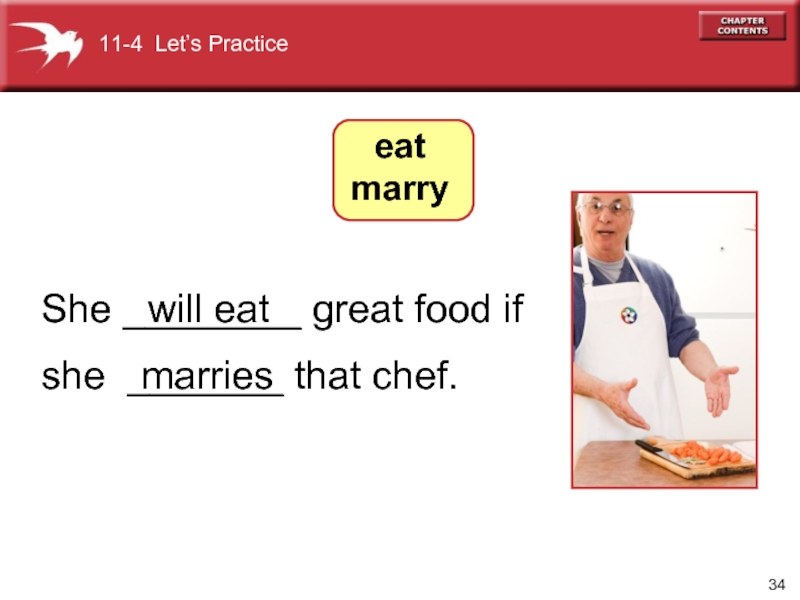
Слайд 35If Jacob ______ to speak Italian,
he ______________ to Italy.
learns
is going to move
will move
learn
move
11-4 Let’s Practice
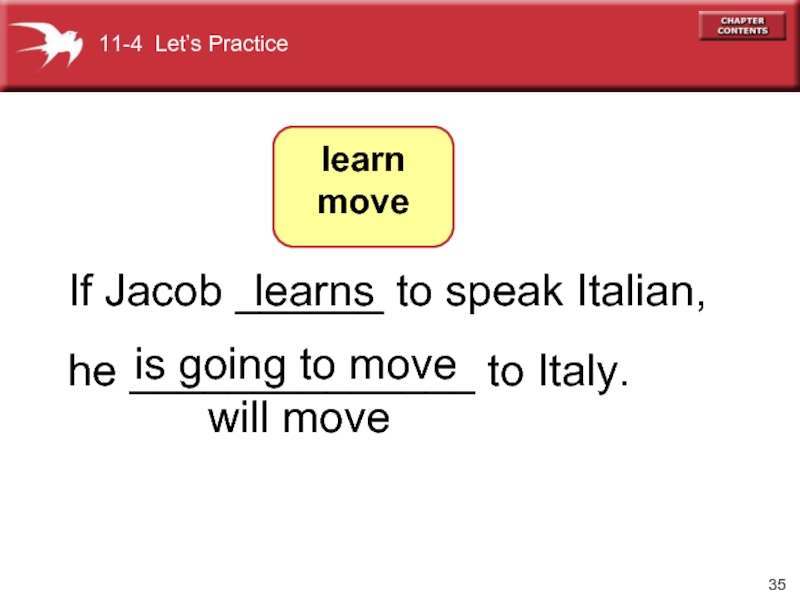
Слайд 36After I finish my work,
I play the piano.
11-5 EXPRESSING HABITUAL
PRESENT WITH TIME
CLAUSES AND IF-CLAUSES
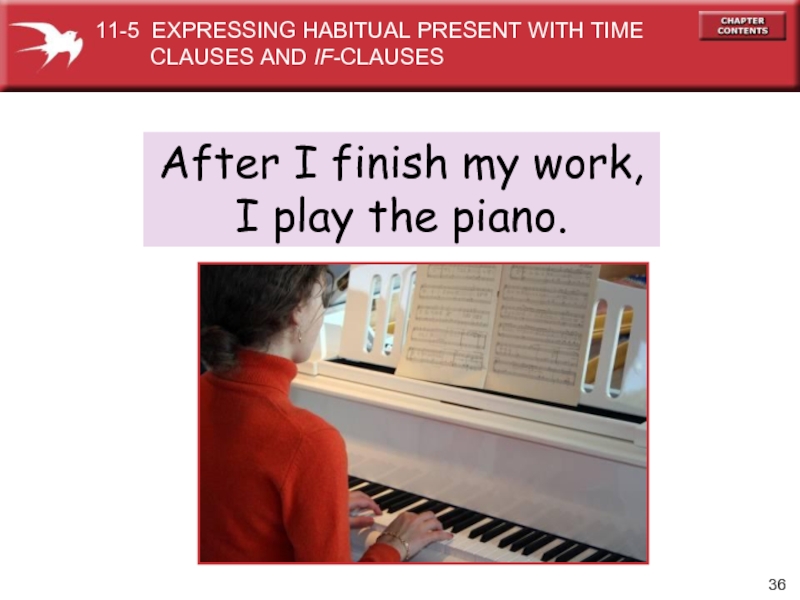
Слайд 37
(a) FUTURE
(b) HABITUAL
PRESENT
simple present
— in the
time clause
After Meg does her homework
(every day), she always plays
the piano.
simple present
— in both clauses
After Meg does her homework,
she will play the piano.
11-5 EXPRESSING HABITUAL PRESENT WITH TIME
CLAUSES AND IF-CLAUSES
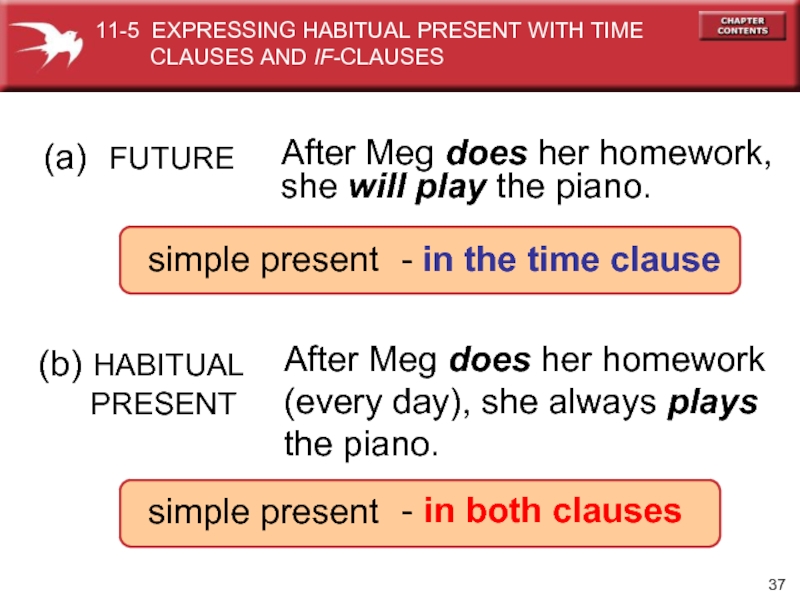
Слайд 38
(c) FUTURE
(d) HABITUAL
PRESENT
simple present
— in
the time clause
If it snows ,I go skiing.
simple present
— in both clauses
I am going to go skiing.
11-5 EXPRESSING HABITUAL PRESENT WITH TIME
CLAUSES AND IF-CLAUSES
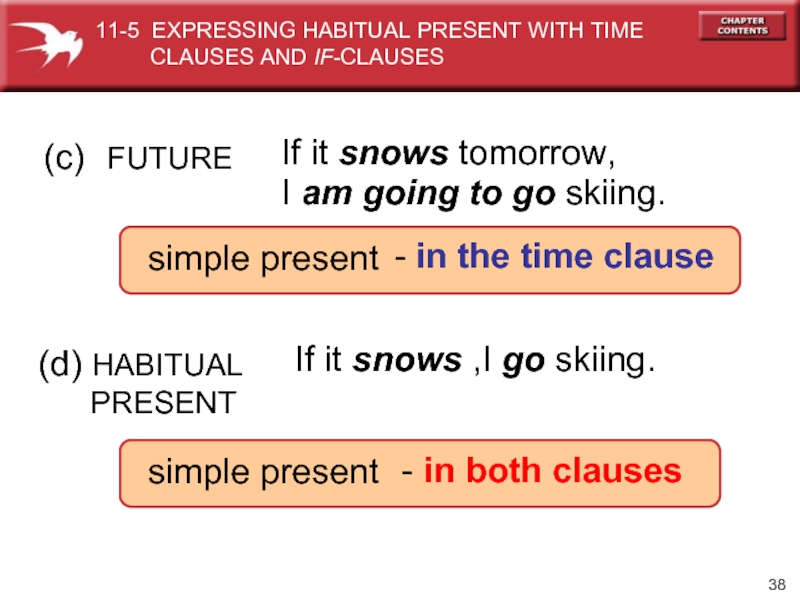
Слайд 39After Jeff ____ to the grocery store,
he is ____________ dinner.
going to cook
goes
go
cook
11-5 Let’s Practice

Слайд 40He always ____ to the grocery store,
before he ______ dinner.
cooks
goes
go
cook
11-5 Let’s Practice
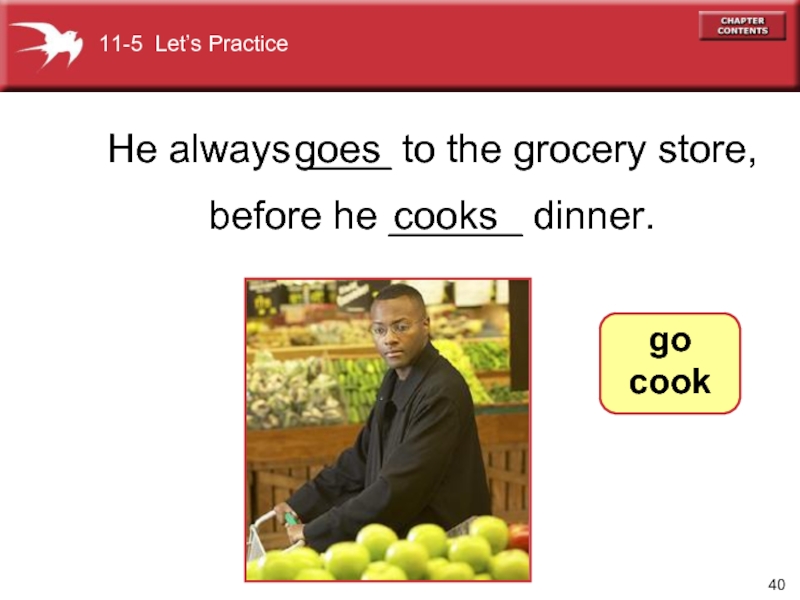
Слайд 41
If it __ sunny, she ______ sunglasses.
wears
is
be
wear
11-5 Let’s Practice
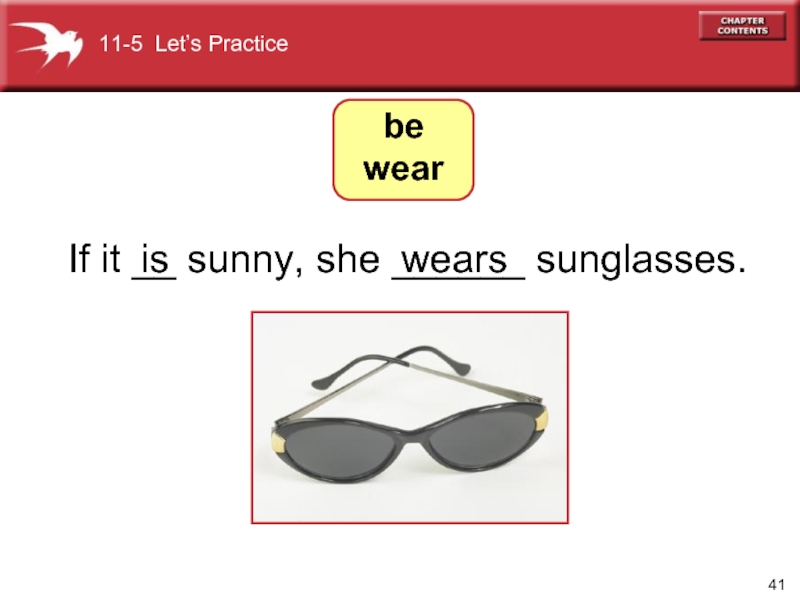
Слайд 42
What does he do every day?
11-6 USING WHAT + A FORM
OF DO

Слайд 43
(a) What does he do every day?
(b) What is he
doing right now?
He works in a hospital every day.
He is working in a hospital.
What +
about
activities
PRESENT
11-6 USING WHAT + A FORM OF DO
a form of do
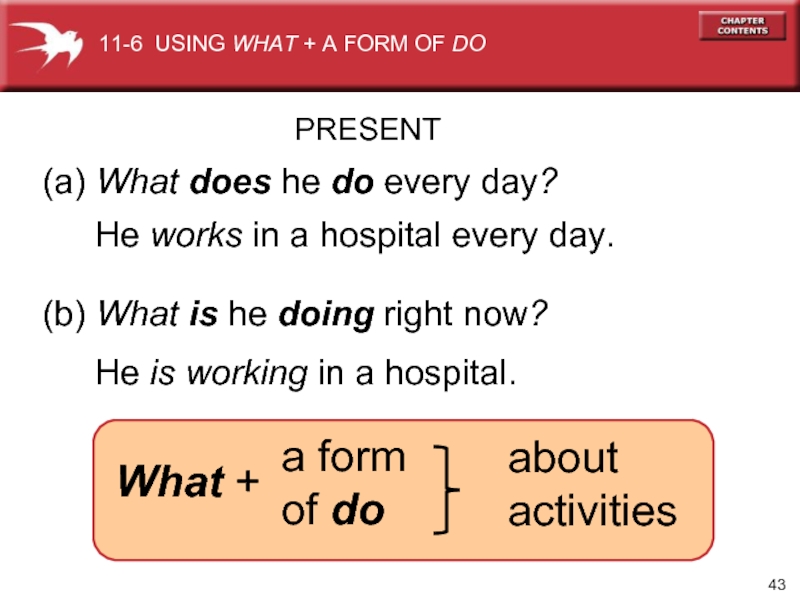
Слайд 44
(c) What does he do?
He is a doctor.
What do you
do? = What is your job?
11-6 USING WHAT + A FORM OF DO
PRESENT
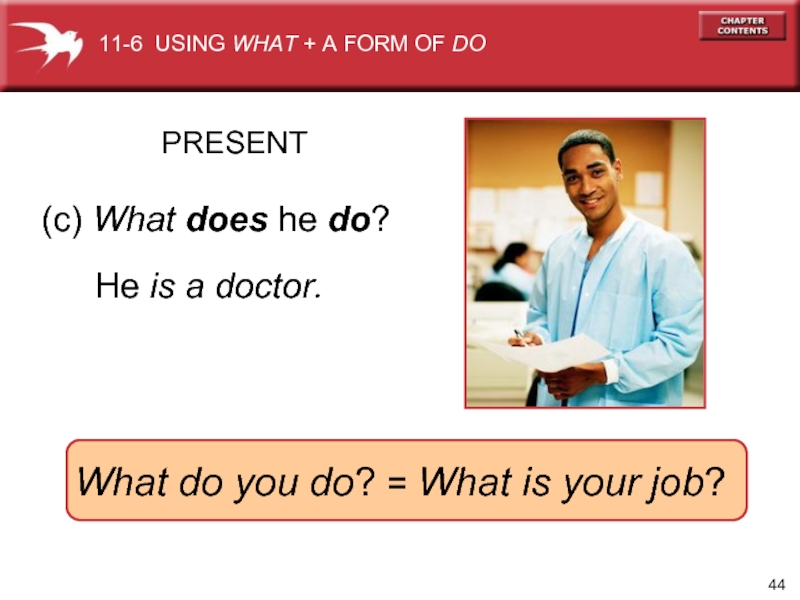
Слайд 45(d) What did she do yesterday?
She flew to Alaska.
11-6 USING WHAT
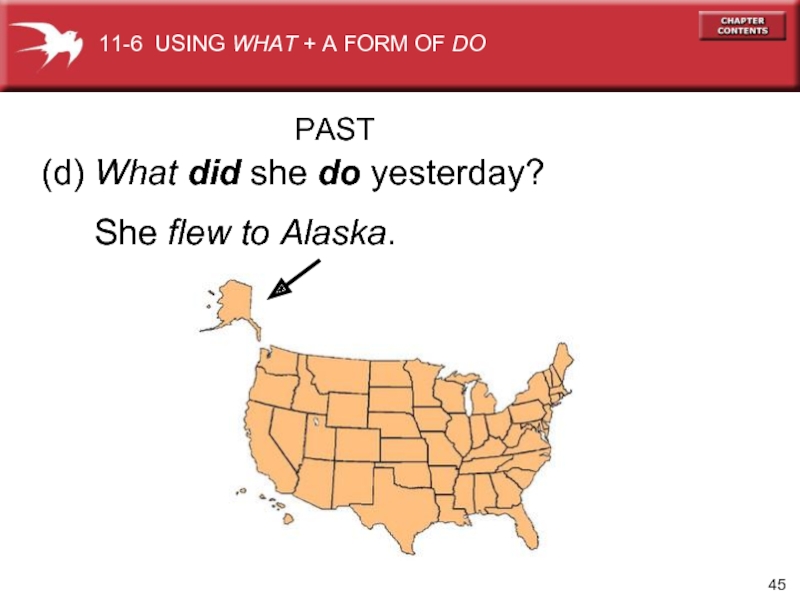
Слайд 46(e) What are you going to do next week?
I’m going to
paint my bedroom.
11-6 USING WHAT + A FORM OF DO
FUTURE

Слайд 47(f) What will we do if the lights go out?
We’ll use
candles.
11-6 USING WHAT + A FORM OF DO
FUTURE
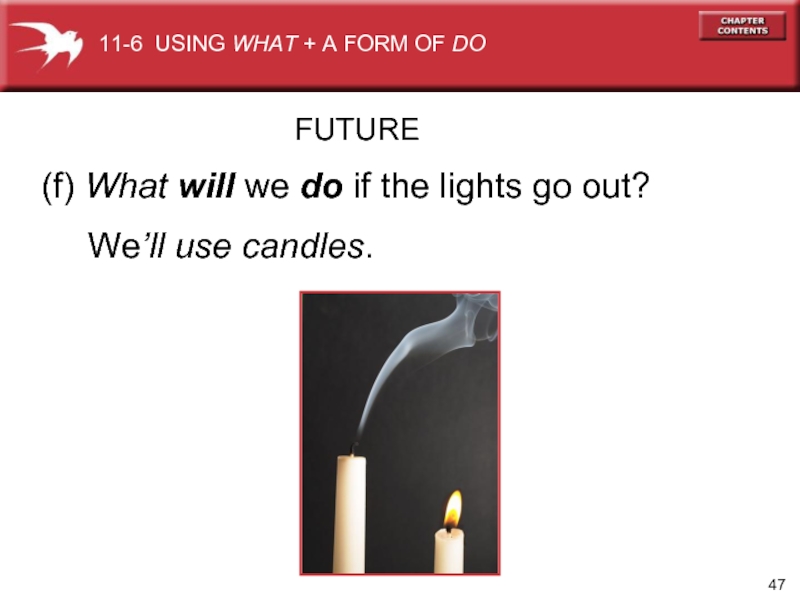
Слайд 48They _________ on Saturdays.
What _________ on Saturdays?
do they do
they
do
play golf
11-6 Let’s Practice
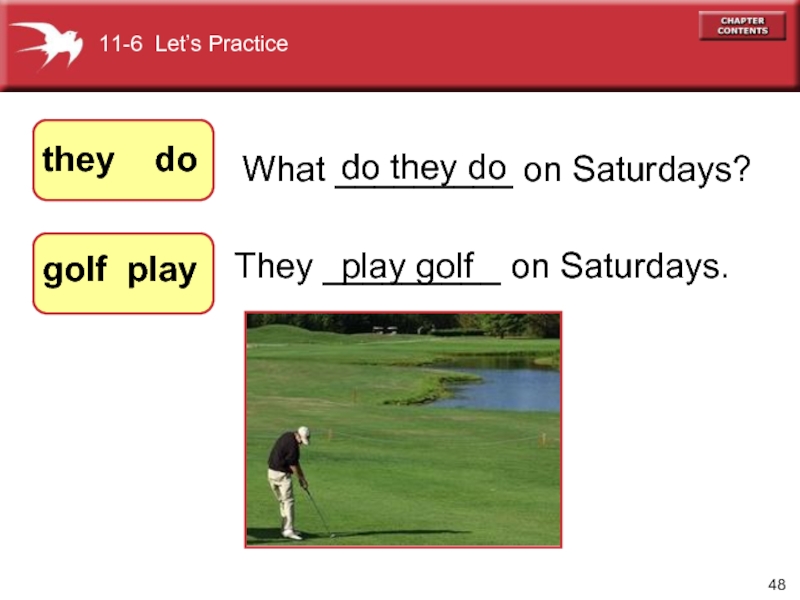
Слайд 49They __________ next Saturday.
What _________ next Saturday?
will they do
they
do
will play golf
11-6 Let’s Practice
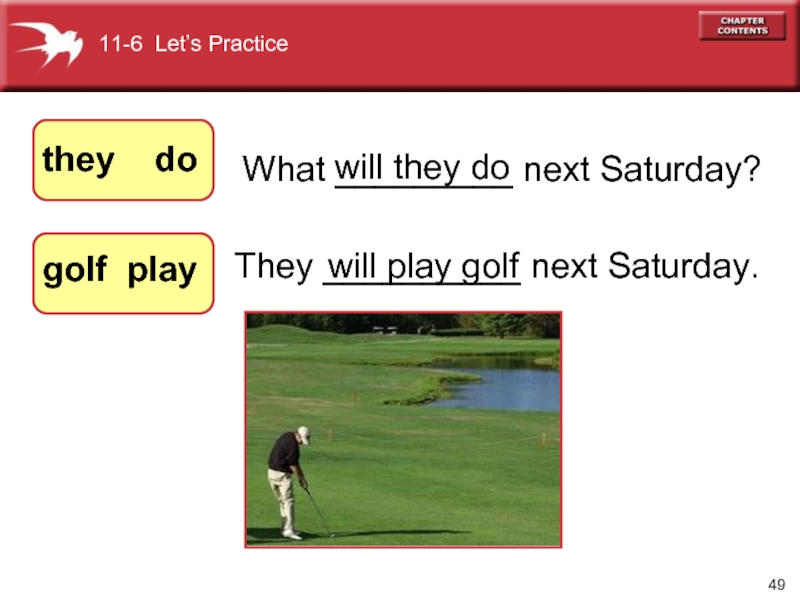
Слайд 50He _________.
What _______ do? (job)
does he
he do
is a doctor
11-6 Let’s Practice
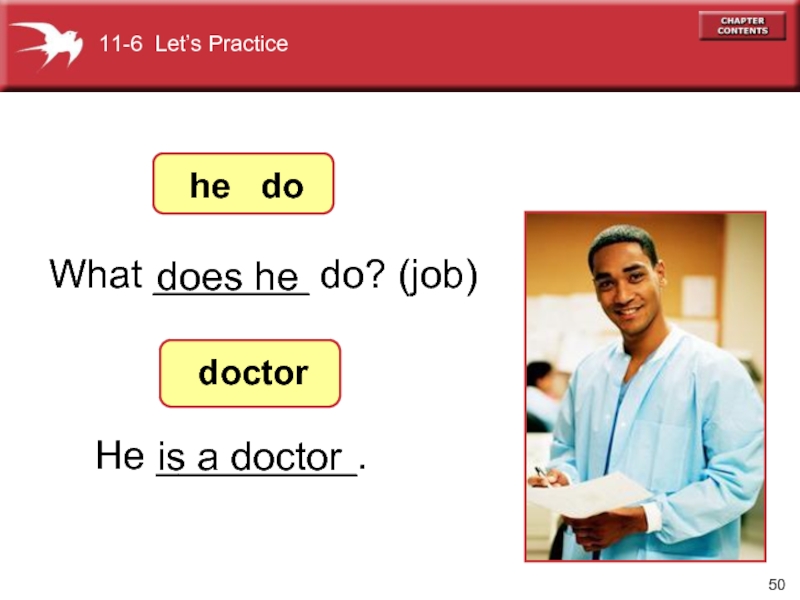
Слайд 51 Images used under license from:
Shutterstock, Inc.
Clipart.com
PHOTO CREDITS

A2
used to show that something is possible or that something might be true:
Maybe you were right after all.
Maybe Ted would like to go.
Maybe we should start again.
«Are you coming to Kelly’s party?» «Maybe.»
«Why were you chosen for the team and not me?» «Maybe it’s because I’ve been to more practices than you.»
SMART Vocabulary: слова и фразы по теме
Вы также можете найти сходные по смыслу слова, фразы и синонимы в темах:
Грамматика
(Определение maybe в Cambridge Advanced Learner’s Dictionary & Thesaurus © Cambridge University Press)
Примеры для maybe
maybe
Ifs and buts and maybes will not do.
There are too many questions, and too many maybes.
Everything else—every other item—would depend on circumstances, happenstances and maybes.
There are many ‘ifs’, ‘buts’ and ‘maybes’, because there is no other way for a diverse family of nations to share power.
They have put their faith in a considerable number of maybes, possibles, and perhapses regarding future income streams.
There were no ifs, buts or maybes.
There are no ifs, buts or maybes.
They started to act as self-conscious actors in the local arenas and, maybe even more important, they were recognised as such by locals and non-locals.
Maybe because someone accompanies them, someone who gives them security and believes in their future.
Beyond that, there is always hope of finding a better solution among the other local minima, and maybe the global minimum.
Anyone’s guess, really, but maybe a clue is what often happens while working in the studio.
Maybe parts of the dissemination problem are due to ignorance of important moral issues.
Maybe there are people who want to read lazy voices and lazy books.
Maybe one day, someone will ask for his autograph.
The function maybe-assign always updates the tree, and can therefore proceed down the tree (thereby freeing the upper levels for other processes).
Любые мнения в примерах не отражают мнение редакторов Cambridge Dictionary или издательства Cambridge University Press или ее лицензиаров.
